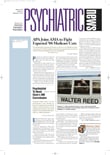Proposed cuts in Medicare physician payments for 2004 are drawing fire—again—from the AMA and other medical groups.
Reiterating an earlier prediction that physician payments would be cut next year, the Centers for Medicare and Medicaid Services last month announced that physician reimbursement would decrease by an average of 4.2 percent in 2004.
Michael Strazzella, deputy director for congressional relations in APA’s Division of Government Relations, said the government ruling was under review, but early indications were that psychiatry would experience an average decrease in payment of 4 percent.
“APA is extremely troubled by the proposed Medicare physician payment reductions for psychiatry and their potential impact on the mentally ill receiving necessary treatment,” he said. “APA, in coordination with the AMA, is continuing to advocate for an immediate legislative fix, as well as a long-term solution to the payment formula.”
AMA President Donald J. Palmisano, M.D., used the announcement once again to urge reform of the way Medicare fees are established. In the meantime, he called for passage of the House of Representatives’ Medicare prescription drug bill, which envisions a 1.5 increase in physician payment in the next two years.
“Recent government-predicted cuts in Medicare physician payments are further evidence of a broken Medicare physician-payment formula and the need for an immediate Congressional fix,” Palmisano said. “If the expected cuts in Medicare physician payments are implemented, it could wreak havoc on the ability of seniors and the disabled to get the medical care they need.”
The AMA and other groups, including APA, have argued that the Medicare payment formula does not reflect the health care needs of beneficiaries.
Fees are established according to an equation known as the Resource-Based Relative Value Scale (RBRVS). The RBRVS, developed in the 1980s by Harvard economist William Hsaio, M.D., was intended to be a data-driven method for determining the value of a physician’s work involved in every type of medical encounter for which there exists a reimbursement code.
The fee is arrived at by adding the “relative value units” of a physician’s work, the “practice expense” relative value unit—which is a measure of costs involved in a clinical encounter—and the malpractice relative value unit. The sum of these components is a total relative value unit (or RVU) adjusted for geographic variation. This RVU is then multiplied by a “conversion factor”—a variable determined by Congress—to arrive at a fee for each reimbursement code.
The process by which the conversion factor is developed, however, is largely secret. And built into it is a mechanism by which Congress can adjust overall spending on the Medicare program whenever the volume of physician services increases.
This mechanism allows Congress to maintain budget neutrality: If service volume goes up, part of the formula will account for it in the form of a reduction in fees.
Some physician groups say the payment rates are causing doctors to cease treating new Medicare patients. The American Academy of Family Physicians, for instance, said that a survey of its members indicated that the number of family physicians not accepting new Medicare patients increased by 28 percent following the 5.4 percent payment rate cut in 2002.
AAFP President James Martin, M.D., said the announced rate cuts for 2004 will exacerbate the problem. “The administration may not be in touch with reality,” he said. “The academy’s own surveys show that more than 1 in 5 of our doctors are not even taking new Medicare patients now. Lower reimbursement rates will only add to that problem. There will be an access problem.” ▪
